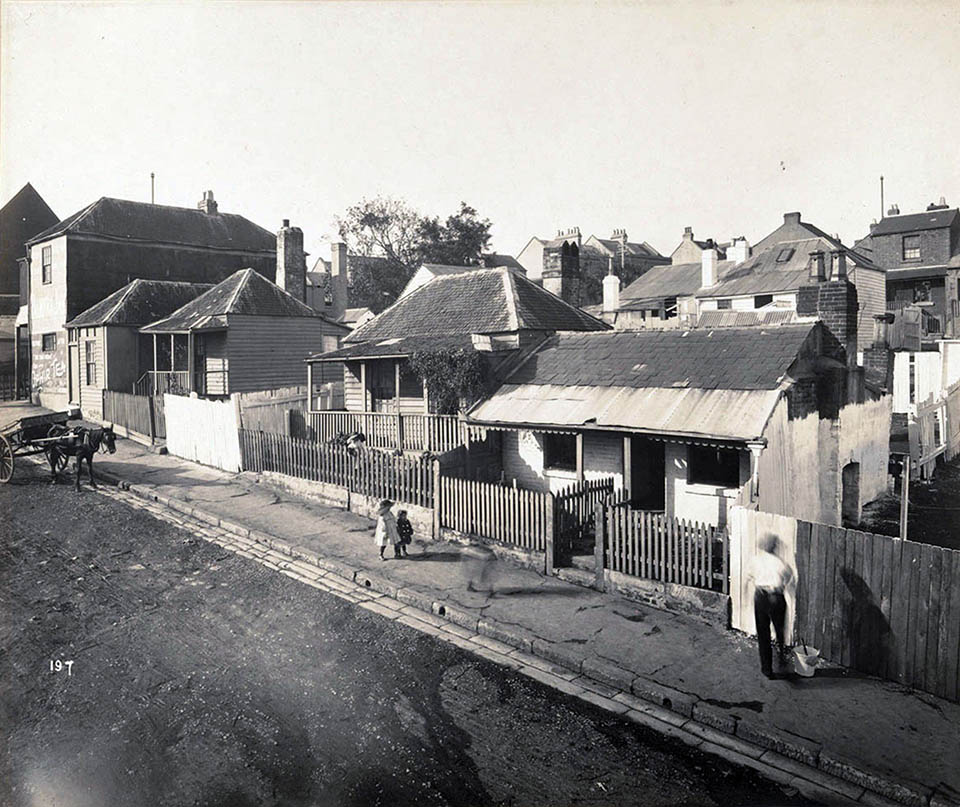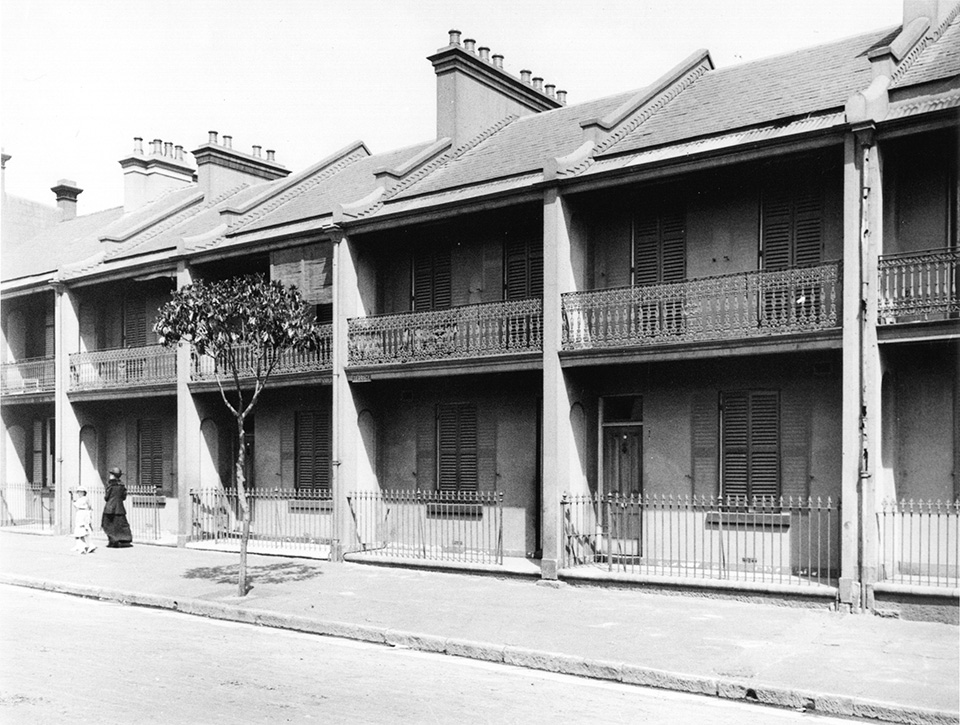Today marks the beginning of National Family History Month... each week the Blogging Challenge has a suggested theme.
This week it is as in the title..
WEEK 1 RUTH PARK - POOR MAN'S ORANGE WEEK ...
As a long time fan of Ruth Park, I had already written a post on her, which I hope many of you have already read, but just in case you missed it, there is an excerpt at the end of the page and the link to the whole post...
POOR MAN'S ORANGE was set in the then working class suburb of Surry Hills. The Dictionary of Sydney, a great go to site, has a very comprehensive article on the history of Surry Hills...

From the collection of the
Another site, one of a few, tells of the history of Surrey Hills..
http://www.surrey-hills.com.au/surrey-hills-history.html
A few excerpts...
If the worn sandstone street kerbing of Surry Hills, Sydney, could talk it would tell some of the most riveting tales of Australia's past.
......................
Surry Hills history mirrors the history of Sydney city. Soon after the First Fleet's 1788 arrival at Sydney Cove, wealthy settlers spread into the fringe areas but within a few decades the wealthy were moving further out of town and the working class was taking over Surry Hills.
By the turn of the century, Surry Hills had become very overcrowded because of this shift in the population.
......................
 When walking past the rows of Victorian terraces today, it is hard to image that 19th and early 20th century Surry Hills was indeed even more crowded.
When walking past the rows of Victorian terraces today, it is hard to image that 19th and early 20th century Surry Hills was indeed even more crowded.
......................
From the collection of the
The staff were very offhanded with her and dismissive of most requests. The first day she had trouble getting anyone to listen to her, or even to get a drink of water.
Image courtesy of State Library of NSW
She had been admitted with some bleeding and when she asked to be changed, she was told that it didn't matter, it'd all be over soon and then she could leave and find somewhere to stay. She protested and said she needed help, then got reprimanded for getting herself into trouble and expecting others to take care of her problems. It was only when the sister left, that another patient told her they treated all unmarried girls like that. My mother was horrified, she was married and showed the girl her ring. She just laughed and said we all buy one of those, not that it makes much difference.
It wasn't till a few hours later when my Dad arrived and insisted on seeing her, that they accepted that she wasn't putting her baby up for adoption as the others were...It took quite some convincing, but she was moved to another ward on my father's insistence. The attitude there was entirely different and she not only got the help that she needed, but an apology as demanded by my father. He was horrified that any of the mothers to be were treated as Mum was.. he tried to get the newspapers to publish a story about it, but they were reluctant to do so, using the excuse that if the girls couldn't go there, they would be forced into having their babies in the streets... as few places would take unmarried mothers.
In later years, more stories were revealed... such as this...
My mother never quite forgave them for treating her and the others in the first ward as if they didn't matter and spent much of her life quietly helping girls who 'got into trouble' as they said then.
Thankfully, those days blended into others.. changes in attitudes and acceptance over time meant that society didn't, for the most part, treat people like that. By no means were all the staff like this, I have nothing but praise for nurses in general, but it always saddens me that my teenage mum went through such a terrible time. She had no mother to assist her, she had died when my mother was just 11, and must have felt so alone. My parents were always very close all their lives and when Mum passed at just 51, it broke my Dad's heart.
One of my mother's sisters had been born there many years before, so my mother had been very confident about going there.

Crown Street Women's Hospital closed in 1983, and with it, went so many memories, some good, some not so good. It was known to be an innovative place regarding women's health and re the survival rate of babies that may have been a lot less if born elsewhere. It had many good outcomes, but hidden away are also many sad stories.
......................
TROVE
THE GIFT THAT GIVES ON GIVING

pre 1947
reproduction rights owned by the State Library NSW
I would think that few of us would instantly recognise this lady, but there would be few Australians, and lovers of great stories, who wouldn't recognise a number of her thoughtful portrayal of the lives of early Australians in "Poor Man's Orange" and "Harps of the South".. the author is Ruth Park. I loved both those books and have reread them over the years. I don't recall reading the third in the trilogy, "Missus".. I must look for that.
Her works included novels, non-fiction and also children's books. She also wrote the children's serial "The Muddle Headed Wombat"...
Rosina Ruth Lucia Park was born on the 21st August, 1917 in Auckland and though she didn't migrate to Australia till 1942, she is often thought of as an Australian writer. I like to think that both New Zealand and Australia can share her.
She lived till the age of 93, passing away on 14 December, 2010.
There is a wealth of information 'freely available' in the 'Pictures, photos, objects' section of TROVE.
You can even read one of her childrens' books, Playing Beatie Bow, by going to open library at
https://openlibrary.org/books/OL4262325M/Playing_beatie_bow
either online, or by borrowing the ebook as it becomes available. You may have to join the waiting list, or links are given to look for it elsewhere.
About the Book
A lonely Australian girl from a divided family is transported back to the 1880's and an immigrant family from the Orkney Islands.
Edition Notes
For 10-14 year olds.
A photo taken in 1962 of Ruth Park holding her cat, can be found at Ruth Park holding her cat outside her home in Balgowlah, Sydney, 10 December, 1962 / John Mulligan. As the copyright is in place for some years yet, I am unable to reproduce it here.
Continued here... link



Chris - this is the most extraordinary story and so important to record. Thank you for sharing and participating in this month's meme. I have taken the liberty of putting your link on my blog using Mr Linky's magical widget but next time, if you like, you can do this and then that way you get to choose what image you want to use from your blog. I hope you don't mind.
ReplyDeleteThank you, Alex. I promised my mother that I would write this story, but not while she and Dad were were still with us. I rewrote this several times, leaving out many of the details as too personal. I think Mum would be happy to know that I kept my promise.
DeleteI would hope that these attitudes were completely gone, but I suspect that some linger on. I don't mind at all, thank you for posting the link.
What an amazing story Chris. It must have been so heartbreaking for the poor single mum's. I'm so glad attitudes have since changed so much in this regard.
ReplyDeleteThanks, Kerryn. I can't imagine what affect these attitudes had on their whole lives. Thankfully, I think that we, as a society, are more tolerant and understanding now... or at least I hope so.
ReplyDeleteI enjoyed the story Chris - it is never good when people change the way they treat you when they revise their opinion of your circumstances. It would be much better if they treated you with dignity and respect always first up. I hope attitudes have changed - I am probably too optimistic.
ReplyDeleteThat is something we all should be entitled to, isn't it Anne.. I like to be optimistic as well. Mum told me this story often over the years, it affected her so much, more for the way that the girls in the first ward were treated, rather than they way she was. I hope by sharing, it will make people think.
ReplyDeleteThanks for sharing your mum's story Chris, and showing how poorly women were treated in those days. Of course men had nothing to do with why they were there. I think we are more forgiving now, or I hope so, but maybe we've just changed our focus of what we condemn. I suspect when I was in hospital with our eldest that might be what they thought too as himself was thousands of kilometres away in PNG - I did get some sceptical looks. Reminds me I should write up that story for my family, privately.
ReplyDeleteThanks for your comments, Pauleen. For some reason, this has only just appeared in comments. I promised Mum many years ago that I would write about this one day, but I had waited till now for obvious reasons. It must have been so hard on her at the time. Her mother died when she was just a child, so no backup to help.
ReplyDeleteAlso it wouldn't have been easy for you without himself by your side, but we do what we must. It's a pity some are so quick to judge...